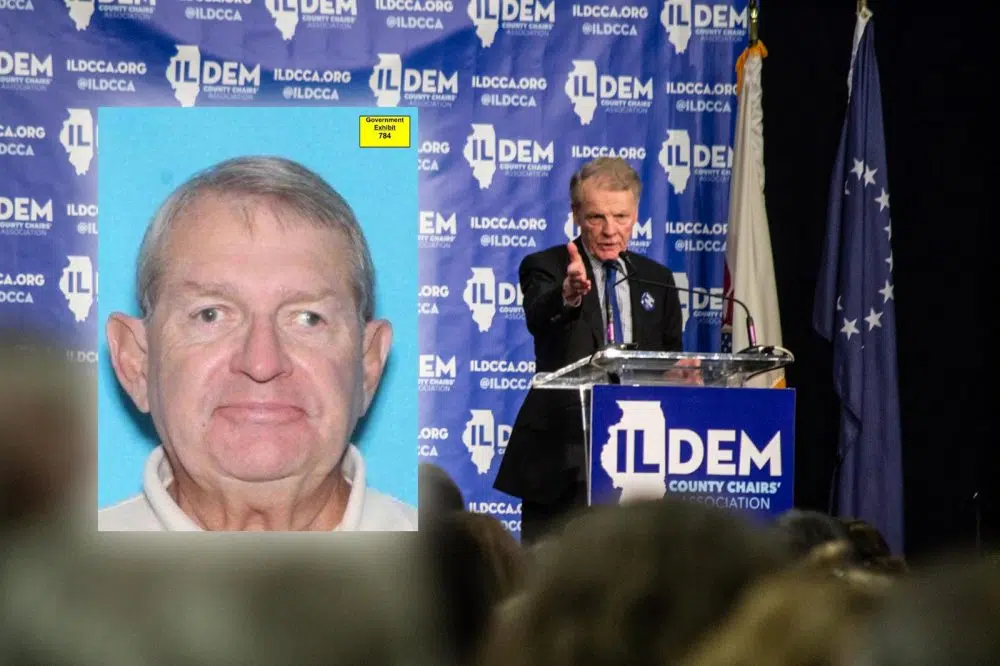CHICAGO, Ill. (Capitol News Illinois)– In the weeks following then-Illinois House Speaker Michael Madigan’s forced ouster of his longtime chief of staff following allegations of sexual harassment, a high-ranking Commonwealth Edison official was considering how to help the disgraced Madigan ally.
Tim Mapes had served as Madigan’s chief of staff for more than 25 years and further solidified his “right-hand man” status by serving as clerk of the House and executive director of the Democratic Party of Illinois. But Mapes was swiftly fired in June 2018 hours after a longtime female staffer publicly accused him of sexual harassment. The next year, an outside investigation corroborated further allegations of bullying by Mapes.
But a little over two weeks after Mapes’ firing, Anne Pramaggiore told one of her most trusted deputies within electric utility ComEd that she kept “thinking about how we can be helpful to him.”
Pramaggiore was less than a month into her new job as CEO of Exelon Utilities – a promotion after six years as CEO of ComEd, where she’d gotten to know Mapes after years of pushing for legislation in Springfield.
“Just my opinion: He’s not employable right now,” advised ComEd’s then-senior vice president of governmental affairs, Fidel Marquez. “Maybe later?”
A federal jury on Wednesday heard a recording of that call, the result of a wiretap on Marquez’s phone. In the next two and a half years, Marquez would become a cooperating witness in the government’s investigation, and Pramaggiore would be indicted on bribery charges, along with three ex-ComEd lobbyists.
The four – along with Marquez – stand accused of orchestrating a yearslong bribery scheme in which ComEd jobs and contracts for allies of the powerful House speaker were traded for help passing the utility’s legislative priorities in Springfield. Marquez’s plea deal and cooperation means he’s eligible for no prison time.
On Wednesday, the June 2018 call played through the courtroom as Marquez sat on the witness stand for the third straight day of prosecutor questioning.
“I think it’s hard to sort of do anything directly, but I think we could, you know, help him,” Pramaggiore said of Mapes. “There’s something out there. We just have to think about it.”
Ten months later, Pramaggiore was still apparently thinking about how to help Mapes, according to another wiretapped call from Marquez’s cell phone in April 2019, nearly three months into his cooperation with the feds.
Marquez was speaking with John Hooker, one of the ex-ComEd lobbyists indicted with Pramaggiore.
“I was talking with Anne and she told me that she’s looking at…doing something for the enterprise and governmental stuff and bringing Mapes on,” Hooker told Marquez. “Now Mapes would work with her, cause she says, ‘I wanted to kinda, well let’s pay him but hide his contract in someone else’s.’”
Hooker told Marquez he’d suggested putting him on as a consultant with Mike McClain, a longtime contract lobbyist for ComEd who was also one of Madigan’s closest friends and confidants. McClain is also a defendant in the case.
“McClain would like that,” Hooker said.
Finding a soft landing for an ally of Madigan’s was not out of place in the world of ComEd’s top executives. In nearly three weeks of trial, prosecutors have shown the jury emails, wiretapped calls and secretly recorded videos in which Pramaggiore, Marquez, McClain, Hooker and their final codefendant, ComEd contract lobbyist Jay Doherty, discussed jobs and contracts for people recommended by Madigan.
Most of those recommendations came to ComEd via McClain, who often described himself as an “agent” for the speaker. As an intermediary, McClain could be aggressive in following up on job recommendations; the jury has seen dozens of emails from McClain seeking updates on job and contract seekers whose names and resumes he’d forwarded to ComEd..
On Tuesday, for example, the jury was shown a series of emails in which McClain was making sure that the utility was hiring interns from Chicago’s 13th Ward on the city’s southwest side, where Madigan has long served as a ward committeeman.
McClain was relentless in pursuing the usual 10 interns ComEd had long set aside for the ward. Applicants in that group did not have to compete against the rest of the 100-plus applicants for internships and often had qualifications like a minimum grade point average and college major waived.
“Is it bad to say I hope he doesn’t respond?” Marquez’s chief of staff asked in an email to her boss in 2017, after back and forth with McClain about the interns over email.
Marquez assured her that she wasn’t wrong for being annoyed.
“It’s not, but you know he will,” he replied.
In another 2017 email, Marquez complained directly to McClain after McClain inquired about whether ComEd was going to hire someone recommended by former State Rep. Eddie Acevedo. McClain had written in an email to Marquez that Acevedo was “driving (Madigan) crazy” over the recommendation.
“Geez,” Marquez wrote back. “He has a son and a nephew at ComEd. He’s got a contract with ComEd. Has he no limit?”
Acevedo was recently sentenced to six months in prison after being convicted on federal tax charges connected with the broader investigation into ComEd.
In 2018, Madigan asked McClain to find a job for the son of longtime U.S. Rep. Bobby Rush. Jeffrey Rush had been convicted of having a sexual relationship with women parolees in a facility he worked at run by the Illinois Department of Corrections.
In a wiretapped call, Madigan told McClain that Rush “got himself jammed up” in the scandal, but he was “gonna wanna help (Rush) somewhere along the road.”
Marquez put his foot down on that request, however, telling McClain that he couldn’t “in good conscience” hire someone with Rush’s record.
“Because there’s no secrets, Mike,” Marquez said, explaining that it would be bad press for ComEd if Rush’s hire was found out.
Another series of emails between McClain and Marquez revealed the extent to which Madigan leaned on McClain — and ComEd — to place people in jobs.
In 2014, Marquez was not responding to McClain in a manner McClain considered timely regarding hiring two men who’d been recommended by Madigan.
“First let me say that I have a lot of affection and respect for you,” McClain wrote in a lengthy email chastising Marquez for his non-response. “Secondly, let me say that when I am with you I find you engaging, insightful, informative and as a person I want to know the rest of my life. I am talking personally and professionally.”
He went on to relay a message from Madigan, who he often referred to as “our friend” or “a friend.”
“But, I was at dinner last night with a friend of ours and he started talking about you,” McClain wrote. “He said ‘are there two Fidels?’ I asked him what did he mean and he said sometimes Fidel is totally responsive and engaging and I feel sometimes he is not with us.”
McClain said he agreed with Madigan’s observation, saying there were times he believed Marquez did “not feel the urgency of a request. Urgency.”
He went on to write that he did not know how to respond to Madigan’s inquiries for updates about hiring of his allies. He said Madigan believed “in his mind there should be a hard and quick favorable response.”
“Please help me,” McClain wrote. “It troubles me greatly.”
After nearly 15 hours of direct examination by prosecutors Monday, Tuesday and Wednesday, the defense began its cross-examination of Marquez on Wednesday afternoon.
The trial continues at 10 a.m. on Thursday.
(Reporting by Hannah Meisel, Capitol News Illinois)
Capitol News Illinois is a nonprofit, nonpartisan news service covering state government. It is distributed to more than 400 newspapers statewide, as well as hundreds of radio and TV stations. It is funded primarily by the Illinois Press Foundation and the Robert R. McCormick Foundation.








